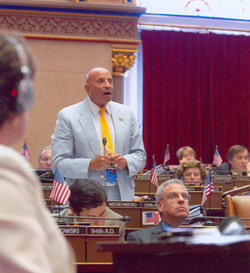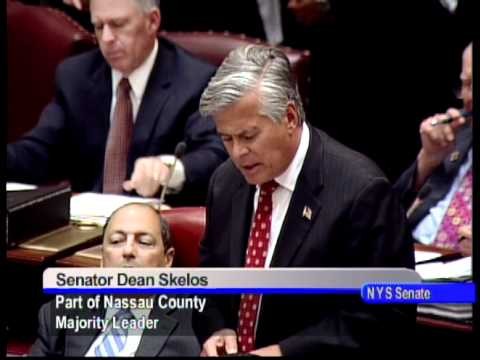Senate kills Long Beach’s deficit financing bill
City considering 14.5 percent tax increase
State legislation that would have allowed Long Beach to issue millions of dollars in serial bonds to pay down a $10.25 million deficit over 10 years — and avoid hitting residents with a 16 percent tax increase — died in the Senate on June 21.
Lawmakers never brought the city’s request to a vote on the last day of the legislative session, as the Republican-led Senate opted not to approve several local borrowing measures — including a $300 million proposal to help Nassau University Medical Center refinance its debt and another borrowing initiative that would have allowed Nassau County to pay back $41 million in property-tax refunds — saying that municipalities should focus more on cutting costs.
“That was the position of the conference: that this bill, along with others like it that would have allowed deficit financing, were not going to be taken up,” said Scott Reif, a spokesman for Senate Majority Leader Dean Skelos, a Republican from Rockville Centre who sponsored the Long Beach bill. “I think our position has been that you put your fiscal house in order through reducing spending — we’ve had a policy that we’re not going to do tax increases or deficit borrowing.”
On May 24, two days after the City Council adopted an $87.9 million budget for 2012-13, council members voted to submit a home rule request to the State Legislature seeking approval to issue up to $15 million in serial bonds to pay down the city’s deficit, replace cash-flow borrowing and ease the burden on taxpayers.
For weeks, city officials expressed confidence that the legislation would pass the Senate and Assembly. City Manager Jack Schnirman publicly thanked Skelos and Assemblyman Harvey Weisenberg (D-Long Beach), who also sponsored the bill, at City Council meetings and in a letter to residents last week, saying that the city was “able to reduce the burden on taxpayers” due to their help. The bill passed the Democratic-led Assembly on June 18 and moved on to the Senate Rules Committee.
“Whether it was Long Beach or another municipality, [the Senate] didn’t want to take it up,” Reif said. “I think [Skelos] wanted to be helpful, but the question was, how do we do that in a way that’s consistent with our principles?”
Weisenberg said he was disappointed, and that Skelos gave him no indication during their talks that the measure would not come up for a vote. “Why in the world would you sponsor a bill and then not bring it up for a vote?” Weisenberg said. “It doesn’t make any sense. I can’t believe that politics is more important than people.”
He added, “The city inherited this deficit from the previous administration and the bill must be paid — it will be beneficial for the city to pay [the deficit] over 10 years rather than three.”
City Manager Jack Schnirman also said that Albany politics were to blame. “The reason you saw us speak about this so confidently is because no municipality has been denied this, and it’s considered a routine approval,” Schnirman said. “The city has balanced its budget and has seen tremendous cost savings, and yet we still must responsibly pay the bill for the deficit we inherited. We have a good working relationship with [Skelos’s] office and we were given no reason to believe that this was in any danger.”
City officials said that they have significantly reduced spending by cutting overtime costs by more than 70 percent, reducing the number of management positions and the size of the city’s work force, and wringing concessions from its largest union that saved the city $2.5 million, among other cost-saving measures.
“There has been a failure on the part of not only the Senate against Long Beach but Dean Skelos,” City Council Vice President Len Torres said. “This was not a bailout of any kind — it spread the debt out further and makes it a little easier for us to breathe. We’ve done all we could in terms of reducing spending, and beyond this we don’t know what else we can do.”
Another Skelos spokesman, Tom LoCascio, said that the city was never given any assurances. And Councilman Mike Fagen said that city officials acted prematurely by saying that the bill was a “done deal” and did not do enough to cut costs.
“They presented a budget that was imbalanced based on wishful thinking, hoping for a miracle from the Senate, without doing any of the hard work that had to be done in order to cut the spending,” Fagen said. “The city hasn’t done nearly enough, and the state agrees.”
Under the city’s initial budget proposal, residents would have been hit with a 4.1 percent tax levy increase and a three-year, 11.9 percent deficit-reduction surcharge that would have net the city $3.3 million per year. Pending state approval of the bonds, however, city officials said that the budget’s combined tax hike was 7.9 percent.
Schnirman said that the city would most likely institute the deficit-reduction surcharge and a 2.6 percent tax levy increase, which requires council approval. Such a measure may be taken up at the next council meeting on July 5, he added, explaining that the city has time to weigh other options as well, and that the Senate may revisit the city’s request during a special session in August.
“We’re going to have a look at all of our options and see what we can do,” Schnirman said. “There’s no instantaneous time pressure on it.”

 56.0°,
Overcast
56.0°,
Overcast 







